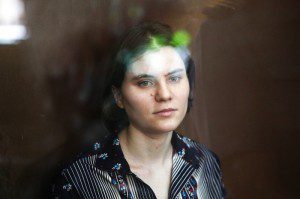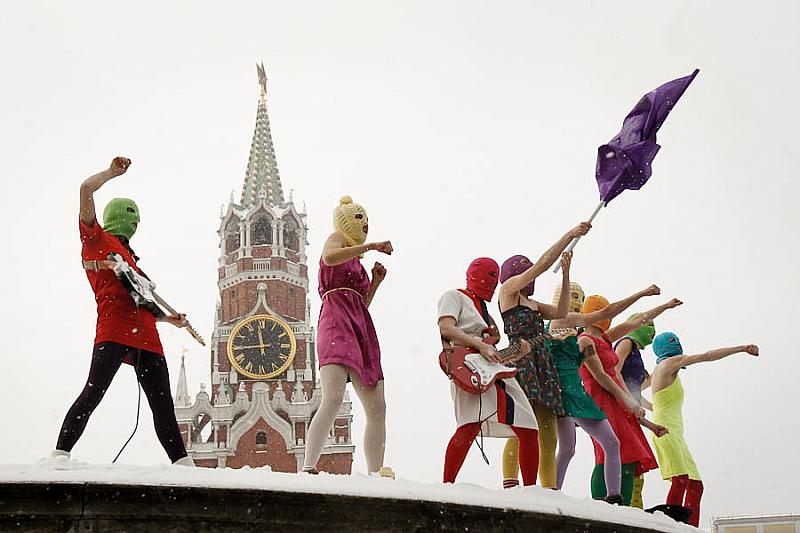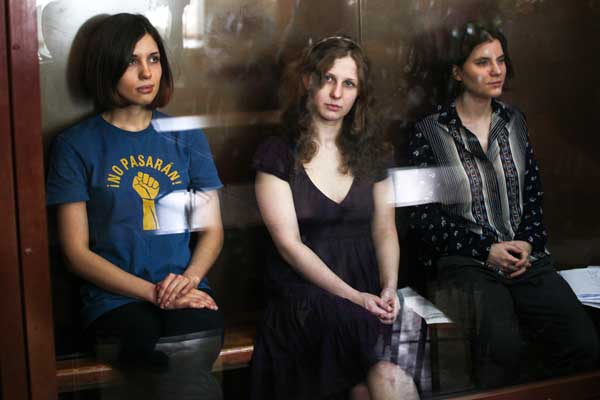Putin’s Russia at war with civil society
Russian authorities not only have narrowed the rules regarding NGOs’ activities, but they also subject civil society activists to direct repression, Andrei Aliaksandrau reports
Russian authorities not only have narrowed the rules regarding NGOs’ activities, but they also subject civil society activists to direct repression, Andrei Aliaksandrau reports
MOSCOW. 26 October 2012 (INDEX).
Earlier this month a Moscow court freed Ekaterina Samutsevich, one of three imprisoned women from Russian punk band Pussy Riot but upheld the two-year jail term handed down to her bandmates. Samutsevich, Maria (Masha) Alekhina and Nadezhda (Nadya) Tolokonnikova were convicted of hooliganism in August after staging a “punk prayer” in a Moscow cathedral to protest the Russian Orthodox Church leader’s support for the president Vladimir Putin ahead of the Russian presidential election. The band’s conviction came amid a wider crackdown on dissent, which has included tighter controls on media, moves towards internet censorship and the harassment and arrest of opposition activists and civil society.

Pussy Riot member Ekaterina Samutsevich sits in a glass cage at a court room in Moscow, August 2012. Maria Pleshkova | Demotix
Samutsevich — also known as Katya — believes everyone has social and political responsibility, and that artists have the power to make “people understand problems they couldn’t see before.” And exercising that responsibility is how Katya got in trouble.
In a week where her comrades were sent to harsh prison camps in remote Russian regions, Samutsevich gave this exclusive telephone interview to Elena Vlasenko, Index on Censorship’s Russia correspondent, and assured her Pussy Riot is here to stay.
INDEX: You were given a suspended sentence on appeal after you alone switched lawyers. The judge’s decision hung on the fact you were ejected from the cathedral before being able to perform but your friends remain in prison. Are the rumours about a split in the group true?
Ekaterina Samutsevich: All the talk about divisions in Pussy Riot are the authorities’ attempt to spin the situation. We definitely didn’t expect my release on probation, [we] thought the sentence would not change. Anyway, this is a victory for all of us … one person out of three is released, or at least on a suspended sentence. Nadya and Masha hugged me and congratulated [me] on this.
INDEX: Why did you switch lawyers? Who disliked your previous lawyer Violetta Volkova most — you or the judge?
ES: Prisoners sometimes change lawyers several times per trial, and that’s ok. I don’t really want to emphasise it, like some media do, that is why I prefer not to comment on the issue.
INDEX: How did you say goodbye to Nadya and Masha? Are you managing to stay in touch?
ES: We wished all the best to each other. We used to write each other letters almost every day before their departure to the penal colonies, but now it’s hard to communicate.
INDEX: You filed an appeal to European Court of Human Rights saying your prosecution and detention violated article 10 of the European convention — free expression — and article 3 — prohibition of torture. Why article 3?
ES: We consider ourselves innocent and the very fact of our detention illegal. The court obviously wanted us exhausted. We were woken up every day at 6am and taken to the court at about 9am, no matter what time the proceedings started. Sometimes we had to wait several hours in a room under convoy before we finally got to the courtroom. The same waiting happened after the proceedings. We spent several hours under convoy waiting for a car, and another hour — in front of the pretrial prison gate. We entered the cell at about 1am. The next day we had to get up at 6am; every day of the proceedings would be the same. Before the proceedings we had to come to the court every morning to familiarise ourselves with the case … We spent two and a half weeks on this schedule.
As a rule, if a case isn’t big — normally criminal cases run to tens of volumes, and ours was only seven — the court holds proceedings once a week. But not this time. From our perspective, the rush was deliberate so that we were too tired to understand what was going on during the proceedings. I was so exhausted once we had to call the ambulance. And the doctors had to give Masha an injection as her blood sugar level dropped dramatically and she was awfully dizzy.
It was torture for us.
INDEX: One could see how physical and rude the bailiffs were to you after the judge ruled. Why?
ES: They were extremely rude and very rough while escorting us to the car: they twisted our arms, for example, maybe so that we couldn’t wave to our supporters. This rudeness is typical towards any person in handcuffs in Russia.
INDEX: Other members of Pussy Riot who remain in hiding told Index on Censorship if they could turn back time they would still repeat the punk prayer. Would you?
ES: Nobody expected the arrests. Punk prayer is not a crime, besides, we successfully left the cathedral without being detained. Of course, we would repeat our prayer: we can’t stay silent … But we would definitely sing the song to the end, the guards didn’t let us that time. I personally would prefer to stay in the cathedral for all the song’s duration, not just 15 seconds.
INDEX: From your perspective what event changed Russia, making it once again the kind of country where controversial trials, like yours, are possible — Putin’s presidency, the Chechen war, the 1996 elections? What was the point of no return?
ES: I don’t think there was a point at all. There are many factors, and one of the most important one is the authorities’ policy towards culture and education. The prerequisites appeared long ago — there was no freedom of expression in the Soviet era — but the situation began worsening sharply when Putin came to power.

Members of Pussy Riot performing in Moscow’s Red Square
People don’t have opportunities to learn about modern art, culture and civil politics. They think politics is a number of high ranking people who sit in their offices. Citizens don’t see themselves as part of policy making, because they simply don’t know they have the right and means to become part of the process. The lack in education leads to the lack of civil protest culture. As a result they play by the rules dictated by authorities.
The only solution is education and self-education, which is becoming more possible because of the internet. The internet is indeed our rescue – as a source of education. The second most important thing is a will to unite, like the lesbian, gay, bisexual, and transgender activists or ecologists recently did. It is important not to count on one leader who will save everyone. There won’t be one, and there shouldn’t be. Pussy Riot is against leaders, we stand for more complex structures of civil communities.
INDEX: Western artists and intellectuals supported you more vocally than those in your own country. Has Pussy Riot suffered for the growing political indifference of Russia’s intellectuals and the artistic community?
ES: Pussy Riot does pay for this. But not only for intellectuals and people of art, but for the whole country’s political indifference. But we should take political pressure and censorship into account. We don’t have art communities which are 100 per cent independent of the authorities.
INDEX: Pussy Riot stands for political art. Does that mean you believe artists have a responsibility to speak out?
ES: Yes, of course, but it is not just artists that have social and political responsibility. Every person is responsible for seeing what surrounds them and for expressing concerns over it. Citizens are provided with power by the constitution and they have a right to influence the situation in a country. That’s what they should do, especially artists. They have the power and knowledge to communicate serious issues in clear, efficient ways which make other people understand problems they couldn’t see before.
INDEX: When will you achieve your goals and stop performing? What is the perfect future for Russia – one where Pussy Riot is no longer needed?
ES: This will happen years from now; now the government is only intensifying repressions. The current power should change the model of its behaviour. People should form a strong and active civil society, which will influence and dominate the authorities — the opposite of what we have now… So we will continue fighting.
 Three members of feminist punk band Pussy Riot were today found guilty of “hooliganism motivated by religious hatred” by a Moscow court, and sentenced to two years in prison.
Three members of feminist punk band Pussy Riot were today found guilty of “hooliganism motivated by religious hatred” by a Moscow court, and sentenced to two years in prison.
Kirsty Hughes, Chief Executive of Index on Censorship, said:
“In Putin’s Russia, free expression has become a crime. The women of Pussy Riot should be released immediately — and should never have been put through this absurd case. Artistic expression is not a crime — it’s a right, and an integral part of all free societies. The PussyRiot verdict is the latest indication that Vladimir Putin’s Russia does not respect human rights and is sliding backwards to dictatorship”.
Nadezhda Tolokonnikova, Maria Alekhina and Ekaterina Samutsevic were arrested in March, after performing a 40-second “punk prayer” against Russian President Vladimir Putin in Moscow’s Christ the Saviour Church. The case has been condemned by activists as being politically motivated, and has drawn criticism from well-known musicians from across the globe.
For media enquiries on this story, please contact [email protected]
With the opening of the Pussy Riot trial in Moscow this week, Elena Vlasenko explains why the feminist punk collective is a threat to the church-state axis of Putin’s Russia
The destiny of Pussy Riot members Nadezhda Tolokonnikova, Maria Alekhina and Ekaterina Samutsevich has merged with the future of Russian democracy.
The three members of feminist protest group Pussy Riot face charges of hooliganism, after allegedly staging an anti-Putin performance in Moscow’s Christ the Saviour Cathedral.
If they beat the charge the civil society which raised its voice against Vladimir Putin in December 2011 will be considerably emboldened.
The question is, what is it about these women, that made them — not Mikhail Khodorkovsky, mothers of Beslan hostage crisis victims, Sergei Magnitsky’s colleagues or Chechen refugees — the reason for such optimism? What exactly made people think Pussy Riot are most likely to trigger change?
The answer lies in the beginning of 2000s, when Russian intellectuals began exchanging their independence for what they thought was stability, and thereby lost their right to establish moral standards. The same happened to one of the biggest institutions, the Russian Orthodox Church.
It is telling that two church patriarchs — Kirill and his predecessor Alexy II — received honorary doctorates from Russian Academy of Public Service under the president of the Russian Federation. The Church’s merger with the State was sealed, and the evidence of that merger is clear:
The Church has traditionally called LGBT people “sick”, echoing the opinion of the Moscow mayor and his counterparts in the rest of the country.
The Church has started a campaign of taking ancient icons out of national museums. The Ministry of Culture, for exampe approved patriarch Kirill’s wish to take a fourteenth century Virgin Hodegetria icon from the Russian Museum in St Petersburg to a new church built by a Russian entrepreneur.
The Church supported establishing radical orthodox nationalist movements, which complied with the government’s youth policy. Most of the activists, whose activities these days boil down to beating and trolling Pussy Riot supporters and regularly protesting against abortions, are publicly hailed by archpriest Vsevolod Chaplin — the head of Synodal department for church and society’s relationship and one of the most influential church bureaucrats. The pro-Kremlin youth movement Nashi has been using the same aggressive methods against those orthodox nationalists hate: rights activists, journalists and artists.
The Church has supported groups persecuting modern artists, in line with the government authorities using anti-extremism legislation to silence Putin’s regime critics. One of the most remarkable examples happened in 2011, when the court labelled a picture of the sermon on the mount — with Mickey Mouse instead of Jesus Christ — extremist. This was one of the paintings of a Forbidden Art exhibition which took place in 2006. The exhibition organisers, Andrey Erofeev and Yuri Samodurov, were accused of incitement to religious hatred, found guilty and fined after religious activists applied to prosecutors, saying the exhibition insulted them.
More controversial stories about Russian Orthodox Church have emerged over the past year. In April 2012, a Moscow arbitration tribunal ruled that Childhood, a rehabilitation centre for gravely ill children in the Moscow area, had to give away one of its two buildings to a convent, which submitted personally to patriarch Kirill.
The merger of the Church and State has even left a trace in Russian language. Philosopher Mikhail Epstein has been organising “word of the year” contests on the Russian-language web. One of the most popular neologisms was the word “religarchy”, which, according to Epstein, showed how close religion and the oligarchy — the actual power behind president Vladimir Putin — had become.
Meanwhile, art was becoming more apolitical. Russia’s notable rock musicians went to chat with Vladimir Putin and Dmitry Medvedev. DDT lead singer Yuri Shevchuk was criticised for “radicalism towards the authorities”.
Individual artists criticised Putin’s authoritarianism, but none of them really dared to protest against the Church’s attempts to help the government control people’s minds.
Russia still hasn’t got its own Richard Dawkins, ready to challenge religion. Between the church’s controversial activities and inteligentsia’s lack of activity in protecting the secular state, the social soil was fruitful for radical protest.
When patriarch Kirill supported Vladimir Putin in the run-up to presidential elections in March 2012, no one was shocked, or inclined to protest such scandalous bias. No-one except Pussy Riot — a new protest group yet to become famous, or to learn how to stop singing out of tune.
While the Church was quite freely merging with the State, future Pussy Riot members participated in different civil initiatives, from situationist arty Voina projects to protecting the Khimki forest.
They judged the victories chalked up to the popular theory of small deeds to be insignificant. This belief, popular among Russian opposition activists abandons attempts to influence government, and instead focuses on small, local changes.
They witnessed how indifferent many intellectuals had become towards the absurdity of the Russian political system and judged opposition leaders to be. They were political sensations a mere three months after Moscow journalists first heard the name Pussy Riot.
Pussy Riot appeared when two contexts collided: the one of the Church merging with the State and the other of Russia being a country of women.
Outside Moscow and the large Russian cities, the country consists of hundreds of small cities, which are all the cities of women, just like in Fellini’s movie. Women in these places run the most important institutions: schools, universities, museums and their families, managing to feed and dress their children with the USD 80 a month their husbands earn as drivers and builders in the big cities western journalists travel to.
It was quite likely that women would initiate a political scandal. There has been a false start in the mid-2000s when businesswoman Evgeniya Chirikova created a movement to defend the Khimki forest and gathered 5000 people — one of the biggest rallies before mass protests for fair elections — in the centre of Moscow.
Since the arrest of the three band members the group has been supported by international musicians like Red Hot Chili Peppers, Franz Ferdinand, Sting and Faith No More. Victorious slogans claim “Putin is afraid of Pussy Riot”. But the number of protesters near the court has not exceeded 300 people. Even Mikhail Khodorkovsky — an oligarch in a country of the poor — gathered at least 1,000 people outside Khamovnichesky court. The lack of solidarity in Russia is perhaps the most important context of the emergence of Pussy Riot.
The scant attention paid to Pussy Riot in Russia is the responsibility of Russian intellectuals, who, during 12 years of Putin’s regime did little to prevent violations of the right to free expression. Censorship dominates Russian television, the judicial system has became more and more corrupted and people have not had access to free information nor efficient propaganda on how to fight for it. For 12 years people have not been able to stand up for themselves, having had no back up from the Moscow elite. No wonder the majority of them aren’t supporting Pussy Riot: they are not used to protecting their own freedom.
Pussy Riot are paying for the intellectuals’ inactivity in taking care of their own people, those who live in numerous cities of women and have no-one to protect them from authoritarian state.
Support actions near the court building are often visited by poet Lev Rubinshtein and artist Andrey Bilzho. Every time they sadly and ironically note that all their counterparts must be on vacations: that must be why they don’t show up to support the women of Pussy Riot, not because they don’t care.
Pussy Riot alone may not trigger a revolution in Russia, where art, punk rock and political debate exist only in Moscow and a few other cities. But their case should stir the conscience of Russian intellectuals, who may yet define the revolutionary programme.